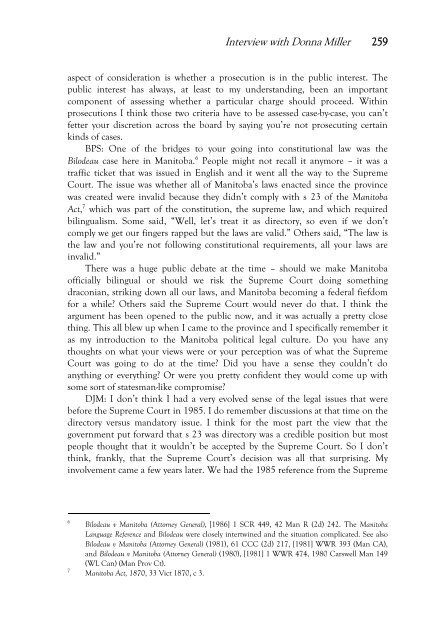Download PDF - Robson Hall Faculty of Law
Download PDF - Robson Hall Faculty of Law
Download PDF - Robson Hall Faculty of Law
You also want an ePaper? Increase the reach of your titles
YUMPU automatically turns print PDFs into web optimized ePapers that Google loves.
Interview with Donna Miller 259<br />
aspect <strong>of</strong> consideration is whether a prosecution is in the public interest. The<br />
public interest has always, at least to my understanding, been an important<br />
component <strong>of</strong> assessing whether a particular charge should proceed. Within<br />
prosecutions I think those two criteria have to be assessed case-by-case, you can’t<br />
fetter your discretion across the board by saying you’re not prosecuting certain<br />
kinds <strong>of</strong> cases.<br />
BPS: One <strong>of</strong> the bridges to your going into constitutional law was the<br />
Bilodeau case here in Manitoba. 6 People might not recall it anymore – it was a<br />
traffic ticket that was issued in English and it went all the way to the Supreme<br />
Court. The issue was whether all <strong>of</strong> Manitoba’s laws enacted since the province<br />
was created were invalid because they didn’t comply with s 23 <strong>of</strong> the Manitoba<br />
Act, 7 which was part <strong>of</strong> the constitution, the supreme law, and which required<br />
bilingualism. Some said, “Well, let’s treat it as directory, so even if we don’t<br />
comply we get our fingers rapped but the laws are valid.” Others said, “The law is<br />
the law and you’re not following constitutional requirements, all your laws are<br />
invalid.”<br />
There was a huge public debate at the time – should we make Manitoba<br />
<strong>of</strong>ficially bilingual or should we risk the Supreme Court doing something<br />
draconian, striking down all our laws, and Manitoba becoming a federal fiefdom<br />
for a while Others said the Supreme Court would never do that. I think the<br />
argument has been opened to the public now, and it was actually a pretty close<br />
thing. This all blew up when I came to the province and I specifically remember it<br />
as my introduction to the Manitoba political legal culture. Do you have any<br />
thoughts on what your views were or your perception was <strong>of</strong> what the Supreme<br />
Court was going to do at the time Did you have a sense they couldn’t do<br />
anything or everything Or were you pretty confident they would come up with<br />
some sort <strong>of</strong> statesman-like compromise<br />
DJM: I don’t think I had a very evolved sense <strong>of</strong> the legal issues that were<br />
before the Supreme Court in 1985. I do remember discussions at that time on the<br />
directory versus mandatory issue. I think for the most part the view that the<br />
government put forward that s 23 was directory was a credible position but most<br />
people thought that it wouldn’t be accepted by the Supreme Court. So I don’t<br />
think, frankly, that the Supreme Court’s decision was all that surprising. My<br />
involvement came a few years later. We had the 1985 reference from the Supreme<br />
6<br />
7<br />
Bilodeau v Manitoba (Attorney General), [1986] 1 SCR 449, 42 Man R (2d) 242. The Manitoba<br />
Language Reference and Bilodeau were closely intertwined and the situation complicated. See also<br />
Bilodeau v Manitoba (Attorney General) (1981), 61 CCC (2d) 217, [1981] WWR 393 (Man CA),<br />
and Bilodeau v Manitoba (Attorney General) (1980), [1981] 1 WWR 474, 1980 Carswell Man 149<br />
(WL Can) (Man Prov Ct).<br />
Manitoba Act, 1870, 33 Vict 1870, c 3.














